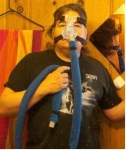I took a very quick look at your report images, and it's tough to make out the numbers, but it looks like you had more central apneas than obstructive apneas in your diagnostic study. Is that right? And that your AHI during your ASV titration was actually slightly worse than in your diagnostic study (5.7 in the diagnostic and 7.6 in the titration) while your total RDI was about the same (7.2 and 7.6, respectively)? I know those numbers are over the course of the whole nights, and the report says in the text that the final settings "resolved all apneas," but it would be nice to know how things progressed. They only had you on the final settings for about an hour it looks like.
Paper_Nanny wrote:Am wondering if I am right in thinking that a higher EPAP is more likely than a lower one to trigger central apneas in those who are prone to such things?
A higher pressure can trigger central apneas in some people, yes. I don't know for those people whether (a) more pressure leads to more centrals; (b) more pressure leads to an increased likelihood of centrals; and/or (c) exceeding some person-specific threshold makes centrals more likely. Maybe someone can chime in on that point.
Paper_Nanny wrote:And the increase in IPAP will keep the airway open for those prone to obstructive events?
Actually it's increasing EPAP that's primarily used to address the obstructive apneas. Increasing IPAP can address "partial airway obstruction such as hypopnea or periodic breathing" (source: Respironics BiPAP autoSV Titration Guide).
Paper_Nanny wrote:One other observation. When I bumped the minEPAP up to 9, my AHI was 9. When I bumped it down to 7, the AHI was 7. I see a pttern here. Tonight, I think I will bump the min EPAP down to 4 and maybe my AHI will finally below 5 and I will be feeling so much better. I may not be prudent, but I am sure as heck logical!!
There are of course the usual words of caution here -- that you should keep your doc in the loop (yeah, I know, you can barely reach the guy), that it takes time for the body to acclimate to new settings, that you should carefully document what settings you had when, and that you should be wary of possible interactions between your changes and your neurological issues. It's all pretty sound advice, and having read your posts, I know you know all this. I'm beating others to the punch on the warnings, though, because on the flip side, I
also thoroughly understand your frustration and exhaustion, having been dealing with it recently myself. In looking at last night's data report and your sleep studies, it isn't clear to me what EPAP is required to address your obstructive events, or whether these hypopneas are obstructive or central in nature. I fully admit that may just be naïveté and ignorance on my part, but at least to my untrained eyes, some of this is perplexing.



















